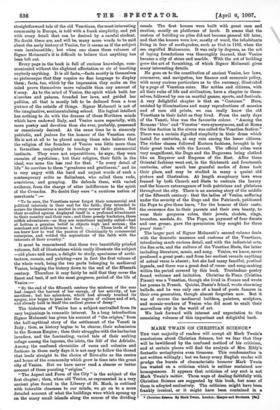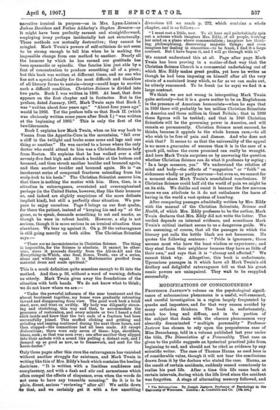MARK TWAIN ON CHRISTLA_N SCIENCE.*
Taz vast majority of readers will accept all Mark Twain's conclusion* about Christian Science, but we fear that they will be bewildered by the confused method of his criticism, and at certain places will find the analysis of Mrs. Eddy's fantastic metaphysics even tiresome. This condemnation is not written willingly ; but we fancy every English reader will grudge the bursts of characteristic humour Mark Twain has wasted on a criticism which is neither sustained nor homogeneous. It appears that criticism of any sort is, not Mark Twain's Maier. Three ways of dealing faithfully with Christian Science are suggested by this book, but none of them is adopted exclusively. The criticism might have been frankly ironical, or it might have been contained in a
• Christian Beience. By Mark Twain. Leaden; Harper and Brotheri, (Si,]
narrative ironical in purpose—as in Mrs. Lynn-Linton's Joshua Davidson and Father Adderley's Stephen Remarx—or it might have been perfectly earnest and straightforward, employing irony perhaps incidentally but not structurally. These methods are mutually destructive ; they cannot be mingled. Mark Twain's powers of self-criticism do not seem to be strong enough to tell him when he is making the impossible change from one method to another. Nearly all the humour by which he has earned our gratitude has been spasmodic or episodic. One fancies him just able by a feat of concentration to produce something all of a piece ; but this book was written at different times, and no one who has not a special faculty for the most difficult and thankless of all literary forms to sustain—irony—could hope to survive such a difficult condition. Christian Science is divided into two parts. Book I. was written in 1899. At least, that date appears on the first chapter and in footnotes. But in the preface, dated January, 1907, Mark Twain says that Book I. was "written about four years ago." "About four years ago" would be 1903. Yet the preface tells us that Book IL (which was obviously written some years after Book I.) "was written at the beginning of 1903." This is only the first of the bewilderments.
Book L explains how Mark Twain, when on his way back to Vienna from the Appetite-Care in the mountains, "fell over a cliff in the twilight and broke some arms and legs and one thing or another." He was carried to a house where the only doctor who could attend to him was a Christian Science lady from Boston. He explains that he has walked over a cliff seventy-five feet high and struck a boulder at the bottom and bounced, and then struck another boulder and bounced again, and then another boulder and bounced again. He is "an incoherent series of compound fractures extending from his scalp-lock to his heels." The Christian Scientist assures him that there is nothing the matter with him. Here, then, is a situation in extravaganza, overstated and overemphasised perhaps (in the United States, however, they like their humour so, and indeed are slightly suspicious of the more delicate implicit kind), but still a perfectly clear situation. We pre- pare to enjoy ourselves. Page 6 brings us our first qualm, for there the patient, instead of "keeping his end up" at the game, so to speak, demands something to eat and smoke, as though he were in robust health. However, a slip is not serious, though it is more serious in an ironical situation than elsewhere. We bear up against it. On p. 20 the extravagance is still going merrily on both sides. The Christian Scientist says :— "There are no inconsistencies in Christian Science. The thing is impossible, for the Science is absolute. It cannot be other- wise, since it proceeds directly from the All-in-All and the Everything-in-Which, also Soul, Bones, Truth, one of a series, alone and without equal. It is Mathematics purified from material dross and made spiritual."
This is a mock definition quite senseless enough to fit into the method. And then p. 26, without a word of warning, defeats us utterly. Mark Twain gives away the foundations of the situation with both hands. We do not know what to think; we do not know where we are
"Under the powerful influence of the near treatment and the absent treatment together, my bones were gradually retreating inward and disappearing from view. The good work took a brisk start, now, and went on swiftly. My body was diligently strain- ing and stretching, this way and that, to accommodate the processes of restoration, and every minute or two I heard a dull click inside and knew that the two ends of a fracture had been successfully joined. This muffled clicking and gritting and grinding and rasping continued during the next three hours, and then stopped—the connections had all been made. All except dislocations ; there were only seven of these: hips, shoulders, knees, neck ; so that was soon over • one after another they slipped into their sockets with a sound like pulling a distant cork, and I jumped up as good as new, as to framework, and sent for the horse-doctor."
Only three pages after this cure the extravaganza has vanished -without another struggle for existence, and Mark Twain is writing like this of Mrs. Eddy's book which contains the healing -doctrines. "It is written with a limitless confidence and -complacency, and with a dash and stir and earnestness which often compel the effects of eloquence, even when the words do not seem to have any traceable meaning." So it is to be plain, direct, serious "reviewing "after all ! We settle down to that, and we certainly, get it with a few unsettling
diversions till we reach p. 272, which contains a whole chapter, and is as follows :— " I must rest a little, now. To sit here and painstakingly spin out a scheme which imagines Mrs. Eddy, of all people, working her mind on a plane above commercialism ; imagines her think- ing, philosophising, discovering majestic things ; and even imagines her dealing in sinoerities—to be frank, I find it a large contract. But I have begun it, and I will go through with it."
We cannot understand this at all. Page after page Mark Twain has been proving in a matter-of-fact way that the Christian Science Church is a commercial undertaking out of which Mrs. Eddy makes great profits, yet here he writes as though he had been imposing on himself after all the very strain of a sustained irony which, so far as we can make out, he utterly renounced. To be frank (as he says) we find it a large contract.
We think we are not wrong in interpreting Mark Twain quite seriously—but it is a grave matter to be an Englishman in the presence of American humourists—when he says that in 1920 there will probably be ten million Christian Scientists in America and three million in Great Britain ; that in 1930 these figures will be trebled; and that in 1940 Christian Scientists will be the governing power in America, and will remain so permanently. Christian Science must succeed, he thinks, because it appeals to the whole human race,—to all who wish to be free of pain and disease. And who does not wish that P It seems to us that the universality of the appeal is no more a guarantee of success than it is in the case of a quack pill, unless the cures promised can really be wrought. And here Mark Twain surprises us by answering the question whether Christian Science can do what it professes by saying :
In a large measure, yes." We understand the relation of mind and body—the effects of " suggestion " or " faith " oa sicknesses wholly or partly nervous—but even so, we cannot for a moment share Mark Twain's scandalised conclusions. If Christian Science could half rid the world of pain we might be on its side. We dislike and resist it because the few nervous cures we can attribute to it do not outbalance the harm of having in the world a vast system of humbug.
After comparing passages admittedly written by Mrs. Eddy with the manual of the Christian Scientists, Science and Health, of which Mrs. Eddy professes to be the author, Mark Twain declares that Mrs. Eddy did not write the latter. The verdict depends on internal evidence, and sometimes Mark Twain's critical instinct seems to us a dangerous guide. We are assuming, of course, that all the passages in which the literary pot calls the kettle black are not humorous. He quotes the following sentence : "Pride is ignorance ; those assume most who have the least wisdom or experience; and they steal from their neighbour because they have so little of their own," and says that it is " clumsy and affected." We cannot think why. Altogether, this book is unfortunate. Uproarious passages in it which have all Mark Twain's old drollery and delightful extravagance tell us that his great comic powers are unimpaired. They wait to be reapplied successfully.











































 Previous page
Previous page